Consumers want to be understood and treated like human beings. They want to connect with their favorite brands on a personal level.
This means that generic email marketing can’t influence them to make a purchase. Simply sending them an email about your best-selling products won’t help to convert shoppers.
You need to develop an understanding of your customers, their needs, pain points, and goals, and then use this information to provide a personalized experience for them. Only then will you be able to create effective email marketing campaigns.
Even though all businesses should be taking advantage of email personalization, less than half of them do.
In this post, we’re going to talk about nine major reasons why personalizing email communication is crucial for today’s businesses.
We’ve included plenty of email personalization stats throughout the post to really make you understand the importance of personalizing your emails.
Are you ready? Let’s start.
1) Personalized email communication increases engagement
Most email marketing campaigns neglect customers’ needs and simply focus on making a sale, which, most often than not, results in measly engagement rates.
Customer-centric, personalized content is key to increasing engagement for your email marketing campaigns. As much as 79% of consumers will only engage with marketing messages if they’re personalized to their interests.
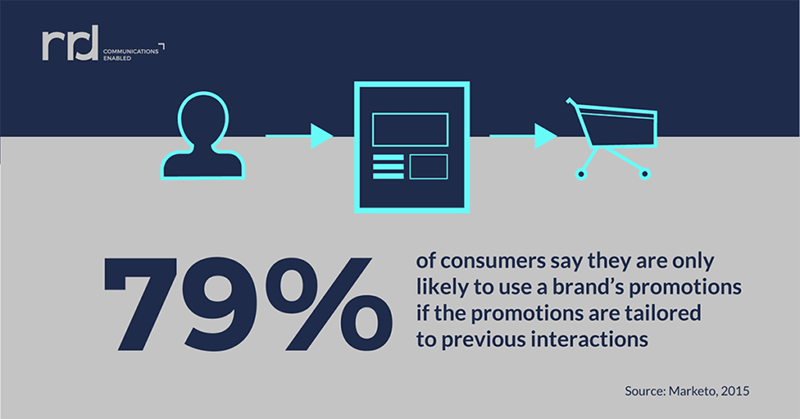
74% of marketers agree that personalization increases customer engagement. 82% of them claim that they’ve experienced an increase in open rates as a result of email personalization.
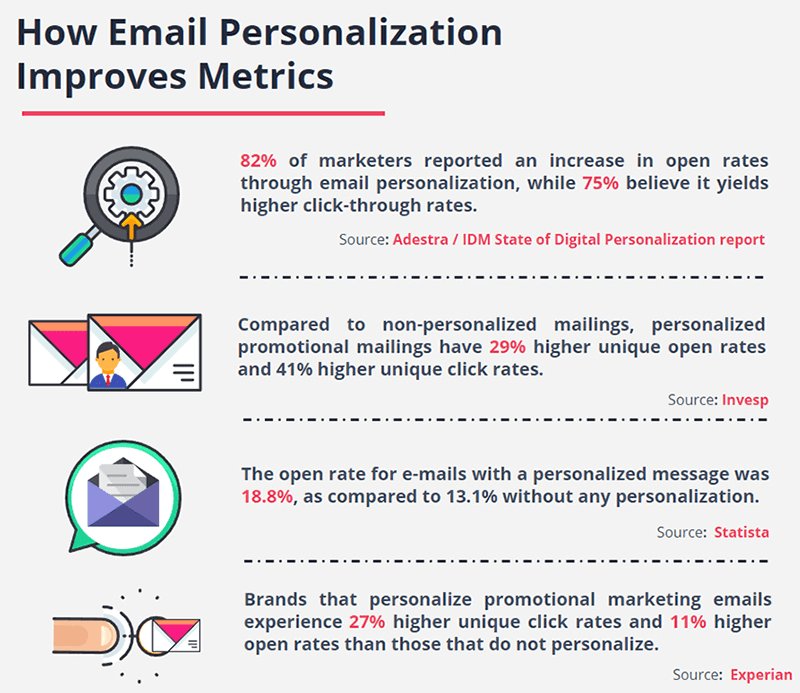
A study by Campaign Monitor supports this, showing that emails containing a personalized subject line get 26% higher open rates. This shouldn’t be surprising at all, since it’s obvious that consumers are more likely to open an email that’s addressed directly to them compared to one with a generic subject line.
Open rates aren’t the only thing that gets improved once you personalize email communication. 75% of marketers state that email personalization has also helped them achieve higher click-through rates.
An Aberdeen study showed that personalized emails get as much as 14% higher click-through rates.
2) Personalized emails increase conversion rates
Personalized emails are filled with content that’s relevant and helpful for prospects, which makes it more likely that they’ll make a purchase as a result of opening and reading such emails.
According to Econsultancy, 93% of businesses experience increased conversion rates when using personalization. Research also shows that personalized emails get 10% higher conversion rates than non-personalized emails.
3) Email personalization shortens the sales cycle
Email personalization allows you to take advantage of data you have on your customers to reduce sales friction, improve your lead nurturing process, and shorten the sales cycle.
Personalizing emails sent to customers makes sure that you’ll offer them exactly the products or services they need and avoid annoying them with irrelevant offers.
Additionally, personalization allows you to improve your lead nurturing efforts by providing leads with content that will help them solve their pain points and achieve their goals.
Personalization can decrease customer acquisition costs by up to 50%.
4) Businesses that personalize email communication generate more revenue
Personalized email campaigns can generate as much as 760% more revenue than non-personalized email campaigns.

According to Segment, 44% of consumers are likely to make repeat purchases with a brand after having a personalized shopping experience, while 40% state that they’ve purchased a more expensive product than they initially planned as a result of a personalized experience.
Online retailers generate more than half of their email-related revenue through personalized emails.
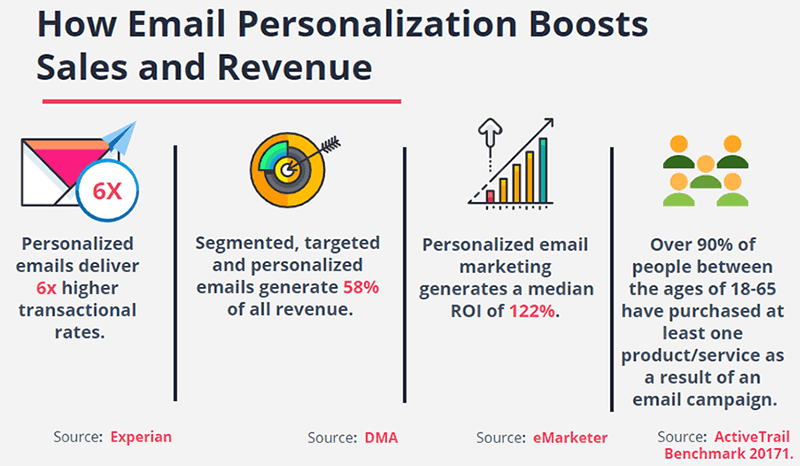
53% of marketers state that personalized communication with existing customers has impacted their companies’ revenue significantly, resulting in a 20% average increase in sales.
Birthday emails, in particular, generate more than three times as much revenue as other, non-personalized promotional emails.
Personalized marketing, as a whole, generates a median ROI of 122%.
5) Email personalization helps you develop a deeper relationship with your audience
62% of consumers are happy to respond to personalized messages from brands. Personalizing email campaigns will enable you to develop a deeper relationship with your audience by allowing you to reach your customers with the right content at the right time.
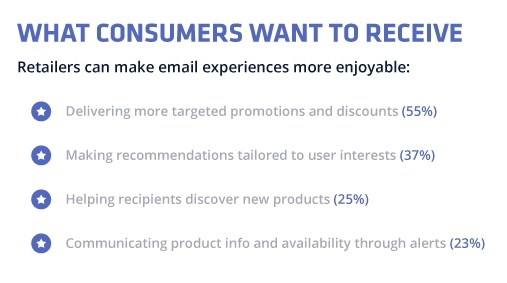
Sending customers educational content they need or recommendations for products that will solve their pain points helps to build trust and strengthen the relationship you have with your customers. It also helps shoppers develop a more positive image of your brand.
Examples of personalized emails that enable you to build a deeper relationship with your audience include birthday emails, anniversary emails, and educational emails.
6) When you personalize email communication, you improve customer satisfaction
Consumers want more personalized experiences. They want brands to learn more about them and understand what they need.
In fact, 31% of consumers state that they’d like online shopping experiences to be more personalized than they currently are. Impersonal shopping experiences frustrate them.
Consumers don’t mind sharing their personal and behavioral data if that will make their shopping experience easier or more affordable. Millennials, in particular, are happy to share their data if it results in a better shopping experience.
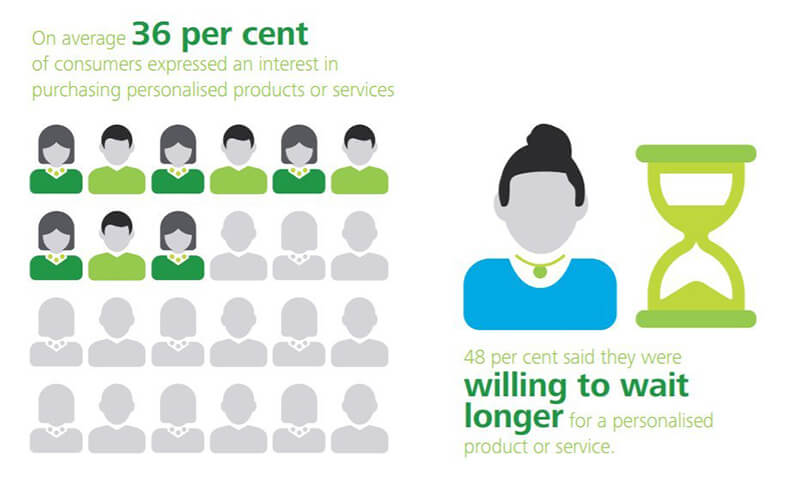
According to Segment’s study, only 22% of shoppers are happy with the level of personalization they’re currently receiving when shopping online. This means that there’s a lot of room for improvement when it comes to providing personalized experiences for shoppers.
Providing shoppers with a personalized shopping experience will help you improve customer satisfaction and set your business apart from the competition.
7) Email personalization allows you to provide better recommendations
Brands have been providing product recommendations to customers for years.
However, when these product recommendations are irrelevant to customers, they can do more harm than good, and result in annoying your customers and having them develop a negative image of your brand.
Personalized product recommendations address this issue.
80% of shoppers state that they enjoy receiving personalized product recommendations from brands. They are as much as 40% more likely to view products that were recommended based on information they’ve shared with a brand.
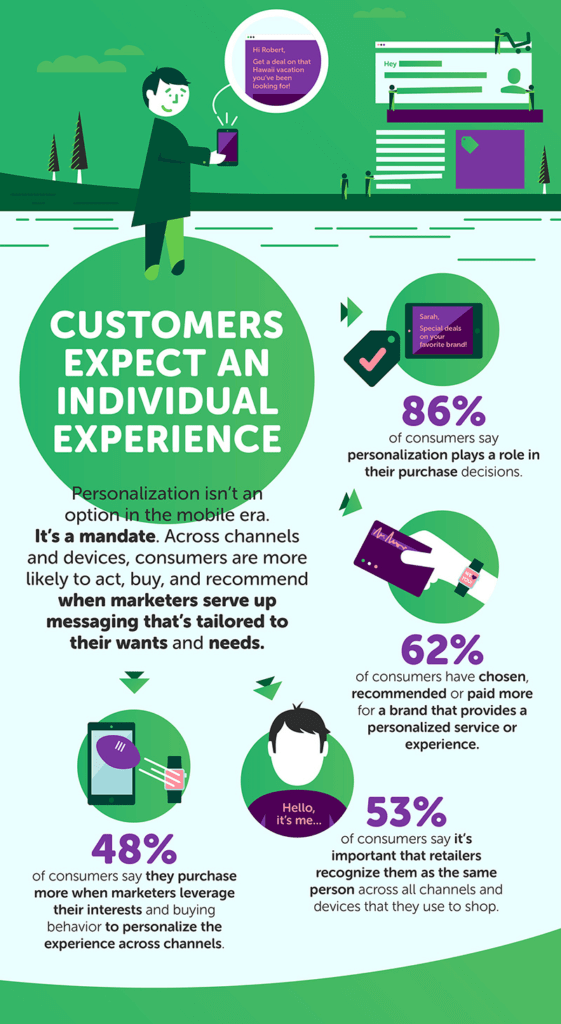
91% of consumers state that they’re more likely to buy from brands that provide personalized offers and recommendations. They’re also prepared to pay more if they get a personalized experience.
Additionally, 49% of shoppers buy products they didn’t initially need as a result of receiving these recommendations.
It’s easy to understand why. Personalized product recommendations help shoppers find products that will solve their pain points, introduce them to products they didn’t even know they needed, as well as simplify the entire shopping experience.
8) Personalized email communication improves customer retention and brand loyalty
Research has shown that most consumers only want to buy from brands that show that they care about them.
Personalized branded content has a positive influence on how consumers feel about your brand. Personalization helps to build trust and makes customers feel more comfortable about buying from you again and again.
It also reduces customer churn.
73% of shoppers prefer buying from online businesses that use their personal information to improve their shopping experience. Additionally, 87% of consumers state that personalized experiences increase brand loyalty.
Improving brand loyalty leads to repeat purchases, as well as referrals. Loyal customers will often act as your brand ambassadors, recommending your brand to their family and friends.
9) Businesses that personalize email communication stay ahead of the curve
While 51% of digital marketers state that personalization is a priority, only 39% of businesses personalize their emails. Similarly, 77% of marketers believe that real-time personalization is essential, but as much as 60% of them struggle with it.
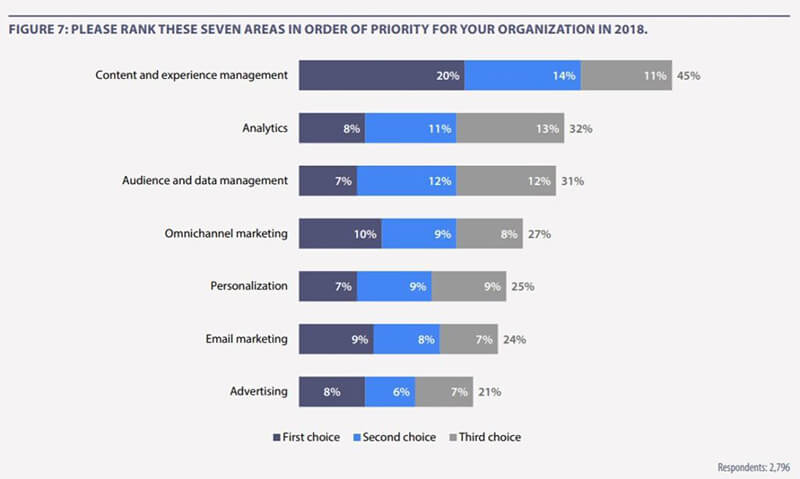
Only 12% of marketers are satisfied with their personalization efforts.
Taking advantage of email personalization (and doing it properly) can help you stay ahead of the curve and outperform your competitors.
Personalize email communication to maximize your email marketing ROI
Email personalization is the key to improving your email marketing campaigns. In fact, most consumers won’t even engage with your email if it’s not personalized to their needs or interests. Personalizing your emails helps improve open rates, reply rates, and click-through rates. It also makes it more likely that prospects will buy from you after reading your emails.
Compared to non-personalized email marketing, personalized emails get 10% higher conversion rates. Email personalization enables you to reduce sales friction and shorten your sales cycle. It helps you have an easier time nurturing your leads since it gives you the opportunity to provide them with relevant content that they’ll find useful.
Personalizing emails can decrease customer acquisition costs by 50%. It can also help generate as much as 760% more revenue from your email marketing campaigns.
Email personalization is responsible for 50% of email-related revenue generated by online retailers. Additionally, more than half of marketers claim that personalized communication with customers has resulted in a 20% average increase in sales for their companies.
62% of consumers love responding to personalized messages from brands. Personalized emails give you the opportunity to develop a deeper relationship with your customers by providing them with just the right content they need at the exact time they need it. This, in turn, helps customers see your brand in a more positive light.
Email personalization can help you improve customer retention and brand loyalty by showing customers that you care about them and positively influencing how they feel about your brand. With a measly 39% of businesses personalizing their emails, focusing on email personalization also helps you stay ahead of your competition.